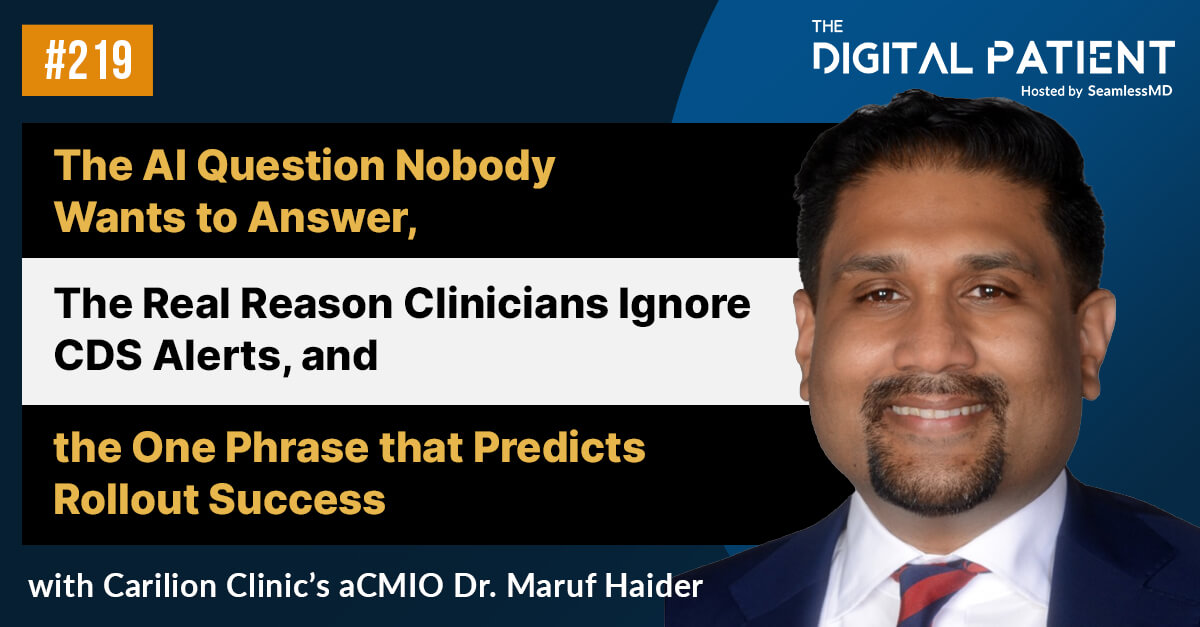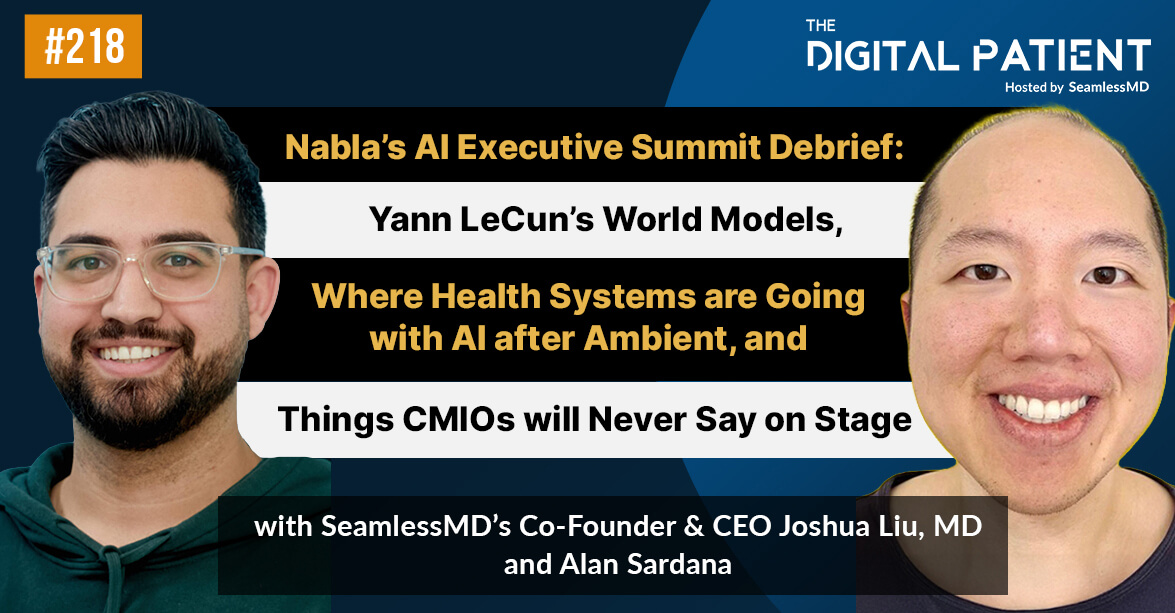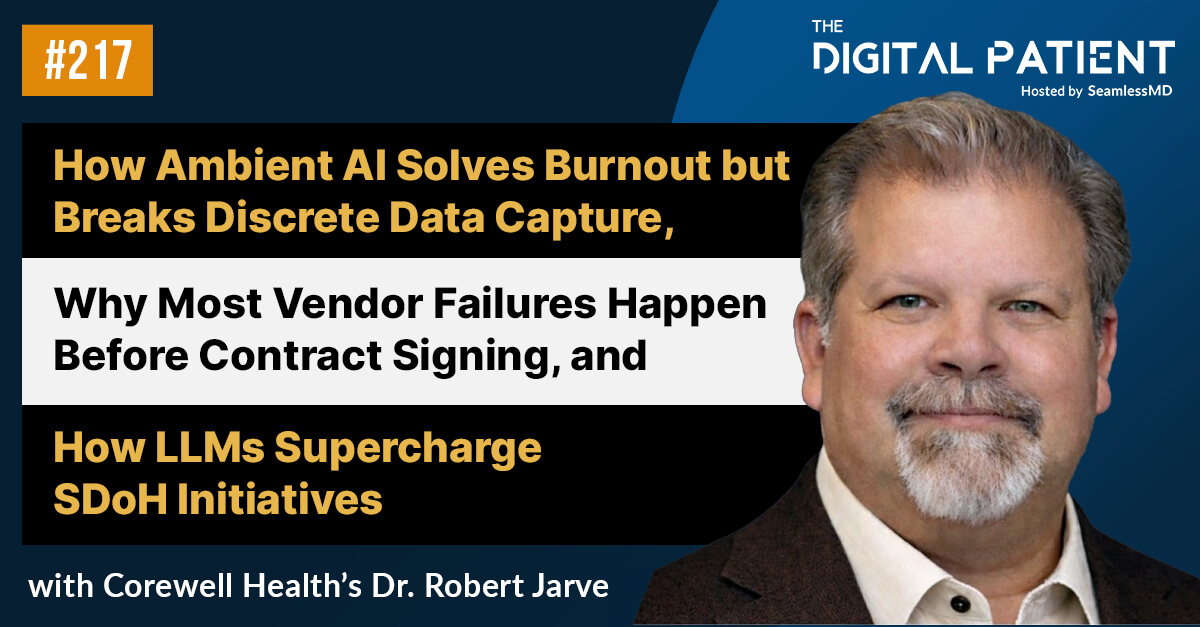Subscribe on: RSS | SPOTIFY | APPLE PODCAST | GOOGLE | BREAKER | ANCHOR
Audio:
Video:
In this episode of the SeamlessMD Podcast, Dr. Joshua Liu, Co-founder & CEO at SeamlessMD, and marketing colleague, Alan Sardana, chat with Dr. Daniel Chu, Vice Chair of Health Services Research at UAB, about "Leveraging Digital Patient Engagement for Enhanced Recovery After Surgery (ERAS) & Health Literacy Strategies". See the full show notes below for details.
Guest(s):
Dr. Daniel Chu (@DChu80), Vice Chair of Health Services Research at UAB
Dr. Joshua Liu (@joshuapliu), Co-founder & CEO at SeamlessMD
Episode 56 – Show notes:
[0:00] Introducing Dr. Daniel Chu, the current Vice Chair of Health Services Research, Selwyn M. Vickers Endowed Scholar in the UAB Department of Surgery, and Associate Professor in the Division of Gastrointestinal Surgery at the University of Alabama at Birmingham. His clinical practice specializes in the spectrum of colorectal disease including inflammatory bowel disease, colorectal cancer, diverticular disease, and anorectal disorders. His NIH-funded research interests focus on identifying, understanding, and reducing health disparities in surgery with particular attention to health literacy.
[1:35] How Dr. Chu learned about Enhanced Recovery After Surgery (ERAS) during his fellowship at the Mayo Clinic and why he believes it is an eye-opening model of care because it benefits patients and can help providers better understand health disparities;
[3:50] Why Dr. Chu believes broad implementation of ERAS is still an ongoing challenge especially in smaller community hospitals due to lack of resources available and that there is room to improve the quality of ERAS implementation with regards to adherence;
[5:04] How Dr. Chu views ERAS in four buckets that are all equally important for a successful ERAS program:
- Development;
- Implementation;
- Sustainment; and
- Auditing.
[6:15] Why Dr. Chu implemented Digital Patient Engagement (SeamlessMD) to help improve ERAS adherence as his team was not satisfied with the status quo and looked to technology to provide patients a way to map their recovery similar to a “map my run” app;
[8:22] Why Dr. Chu focuses on health literacy because it is associated with poor health outcomes, can drive healthcare disparities, and is actionable;
[10:10] How UAB researchers analyzed discussions between surgeons and new patients to provide an opportunity to improve verbal communication through coaching, training and real time feedback, and to apply best practices such as the teach-back method to improve patient comprehension before surgery;
[14:28] Why Dr. Chu believes Patient Engagement technology (like SeamlessMD) are beneficial for Enhanced Recovery After Surgery (ERAS) because they can help reinforce the best practices that make ERAS successful, improving patient adherence via education & reminders at the right time;
[17:14] Why Dr. Chu chose to implement SeamlessMD for Colorectal Surgery first before rolling it out across the Surgical Department because he had some control over it as Chief of the department and could easily obtain outcomes data to prove efficacy;
[19:55] How UAB patients using SeamlessMD cost an average of $1,386 less than patients without the technology and why Dr. Chu attributes the cost savings to reductions in Length of Stay during a patient’s initial stay as well as reduced stay post-op 30 days if the patient were readmitted;
[21:55] How COVID pushed UAB to implement outpatient colectomies for a select group of patients based on a combination of factors and why those patients were required to use SeamlessMD as it provided the team remote patient monitoring after the surgery;
[25:42] Why Dr. Chu is focused on understanding health disparities as medicine often focuses on the majority of patients, and expands barriers for certain patients who likely need additional support;
[28:18] How UAB fosters academic productivity by encouraging a culture of clinicians who value research;
[30:47] Why Dr. Chu believes Digital Patient Engagement is important technology to collect Patient-Reported Outcomes that are not routinely captured in the EMR such as patient symptoms (nausea, mood, sexual dysfunction, etc.) as well as opioid consumption because it provides a psychologically safe outlet for patients;
[35:18] How integrating Digital Patient Engagement into the EMR provides a seamless experience for providers where they can automatically enroll patients with one-click from the EMR and view Patient-Reported Outcomes back in the EMR without having to log into multiple systems;
[37:22] How Digital Patient Engagement has caught complications much earlier at UAB so the patient could be readmitted immediately, avoiding the ER, enabling the team to begin treatment sooner and avoid patient mismanagement;
[38:45] Why Dr. Chu believes healthcare will adopt a hybrid practice where virtual visits can continue to be an option for some patients post-pandemic as it allows providers to give the same quality conversation, especially for patients who live hours away from the hospital;
Fast 5 / Lightning Round:
Q1: What is your favorite book or book you’ve gifted the most?
“Calvin and Hobbes” series by Bill Watterson
Q2: How has an apparent failure set you up for greater success?
“I’ve failed so many grants… 3, 4, 5, times… Those failures set you up to be persistent… Things get so much better when you fail.”
Q3: Would you rather have Super Strength, Super Speed, or the ability to Read People’s Minds?
“Mind reading… It would help you to be more impactful when you negotiate and work in teams… Good leaders are really empathetic. They understand what someone else might be going through and can help that person reach their end goal.”
Q4: What is something in healthcare you believe that others might think is insane?
Surgery. “If you came to my operating room and saw some of our crazier surgeries… You might think it’s insane what we have to do sometimes to remove things and put things back together.”
Q5: What is one hobby or activity that you’ve gotten into since the beginning of the pandemic?
“Grilling! I love to grill and my daughter helped me create a grilling Instagram as a repository of different things we’ve tried so I can now show people.”
Check out Dr. Chu’s awesome Instagram here: @TheGrillingSurgeon
.svg)










.png)
